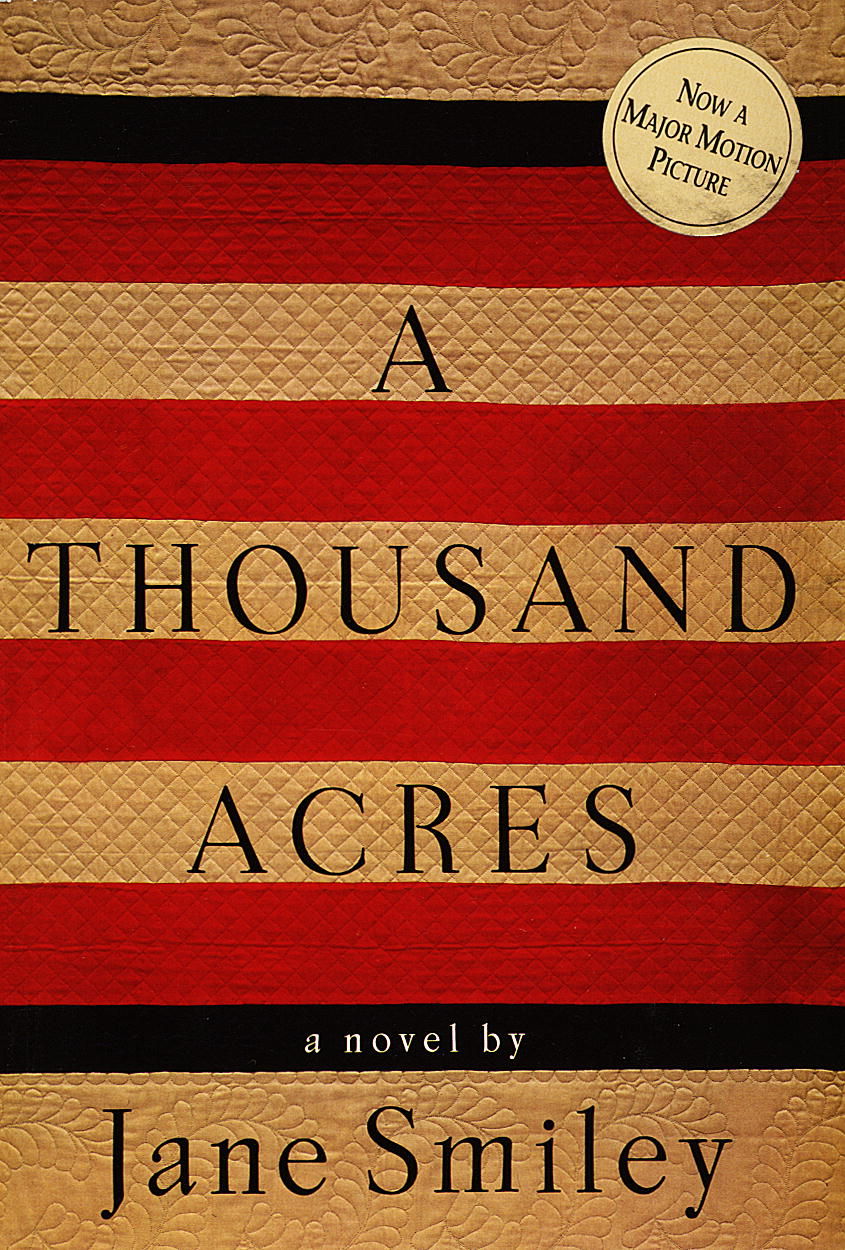
A farm owned by Larry Cook, the patriarch of a family that for generations has cultivated the land and can proudly claim that its one thousand acres make it one of the biggest in Zebulon County, a farmer’s community in Iowa, where “acreage and financing were facts as basic as name and gender”, is at the core of this stunning novel by American writer Jane Smiley. Narrated in the first person by Ginny, Larry’s oldest daughter, the story develops following its own intricate rhythm and pace. The tone is somber, and the descriptions go into much detail about matters important to the narrator, that the reader may not find interesting at first but that will eventually fit in the story as a whole.
AT SIXTY MILES PER HOUR, you could pass our farm in a minute, on County Road 686, which ran due north into the T intersection at Cabot Street Road. Cabot Street Road was really just another country blacktop, except that five miles west it ran into and out of the town of Cabot. On the western edge of Cabot, it became Zebulon County Scenic Highway, and ran for three miles along the curve of the Zebulon River, before the river turned south and the Scenic continued west into Pike. The T intersection of CR 686 perched on a little rise, a rise nearly as imperceptible as the bump in the center of an inexpensive plate.
The family history is present in everyday life. The origins of the ancestors are in a way an explanation of the generations that came afterwards. Tradition is part of who they are and most importantly, it explains the idiosyncrasies of their personalities. Throughout the novel, the eccentricities and mannerisms of each of the characters intertwine and produce a chorus of voices that are as visceral as the fertility of the land itself.
MY GRANDMOTHER’S PARENTS, Sam and Arabella Davis, were from the west of England, hilly country, and poor for farming. When they came the first time to Zebulon County, in the spring of 1890, and saw that half the land they had already bought, sight unseen, was under two feet of water part of the year and another quarter of it was spongy, they went back to Mason City and stayed there for the summer and winter. Sam was twenty-one and Arabella was twenty-two. In Mason City, they met another Englishman, John Cook, who, as he was from Norfolk, was undaunted by standing water. Cook was only a clerk in a dry-goods store, but a reading man, interested in the newest agricultural and industrial innovations, and he persuaded my great-grandparents to use the money remaining to them to drain part of their land. He was sixteen years old. He sold my great-grandfather two digging forks, a couple of straight-sided shovels, a leveling hose, a quantity of locally manufactured drainage tiles, and a pair of high boots. When the weather warmed up, John quit his job, and he and Sam went out among the mosquitoes, which were known as gallinippers, and began digging. On the drier land, my great-grandfather planted twenty acres of flax, which is what every sodbuster planted the first year, and ten acres of oats. Both flourished well enough, compared to what they would have done back in England. In Mason City, my grandmother, Edith, was born. John and Sam dug, leveled, and lay tile lines until the ground was too frozen to receive their forks, then they returned to Mason City, where both made acquaintance with Edith, and both went to work for the Mason City brick and tile works.
By the second chapter (of a total of forty five that cover three hundred and sixty seven pages) we learn that in May of 1979, during the homecoming gathering for Jess, Harold Clark’s prodigal son that has been away for thirteen years, old Larry (they are both neighbors and are extremely competitive with each other), who has been drinking heavily that afternoon (this being one of his many defects, as we keep reading), decides to give the farm to his three daughters, Ginny, Rose and Caroline, saving through the transaction a great deal of money in taxes. The decision, the result of long talks with his attorney, comes as a surprise to all, and Caroline, the youngest and only daughter who lives in Des Moines where she works as a lawyer, does not wish her share and backs off from the offer. She will eventually turn into Larry’s ally as the story unfolds.
He glanced at me, then at Caroline, and, looking at her all the while, he said, “We’re going to form this corporation, Ginny, and you girls are all going to have shares, then we’re going to build this new Slurrystore, and maybe a Harvestore, too, and enlarge the hog operation.” He looked at me. “You girls and Ty and Pete and Frank are going to run the show. You’ll each have a third part in the corporation. What do you think?”
Jane Smiley has said that she read Shakespeare’s King Lear in High School for the first time and the story remained in her ever since. Years later, when she reread it, she was convinced about adapting it in a novel. During the years she lived in Iowa, one afternoon as she happed to be looking through the window of her car, she was impressed by the vast land and all the farms, each different from the other, each with a unique story behind, and decided, without knowing much about farm life herself, that it would be the ideal setting for her novel. And so, a long period of preparation came, of interviewing farmers, of getting to know all the aspects of farm life that would later come in her book.
There is not only honesty but the ability to enter the depths of human nature through a fluid narrative that surprises the reader as it evolves. Smiley is very convincing as her writing only confirms her understanding of the conflicts that arise. In her hands, words seem like the harvest of a very good year. All the elements attain balance as each idea is linked to the next skilfully. That is what I can define as the authority of a writer. “Our farm and our lives seemed secure and good”, notes Ginny in the first chapter of the book, as she is telling us how she saw her life in early childhood. But as it often happens, there are plenty of surprises in store that add to the tragedy of the story. An important element of the narrative is the ability to enter the mind of the character, what he or she thinks at a precise moment, without saying it. And this deliberate power bestowed upon the reader, makes for a penetrating and reflective experience.
The way Ginny sees his father, is a good example of how we enter little by little the minds of the characters. The sense of catastrophe is present in the choice of words and in the tone of the description. For example, the word distance appears four times in the following excerpt:
My earliest memories of him are of being afraid to look him in the eye, to look at him at all. He was too big and his voice was too deep. If I had to speak to him, I addressed his overalls, his shirt, his boots. If he lifted me near his face, I shrank away from him. If he kissed me, I endured it, offered a little hug in return. At the same time, his very fearsomeness was reassuring when I thought about things like robbers or monsters, and we lived on what was clearly the best, most capably cultivated farm. The biggest farm farmed by the biggest farmer. That fit, or maybe formed, my own sense of the right order of things.
Perhaps there is a distance that is the optimum distance for seeing one’s father, farther than across the supper table or across the room, somewhere in the middle distance: he is dwarfed by trees or the sweep of a hill, but his features are still visible, his body language still distinct. Well, that is a distance I never found. He was never dwarfed by the landscape—the fields, the buildings, the white pine windbreak were as much my father as if he had grown them and shed them like a husk.
The story is much about the land as it is about the father, and how each of the other characters sees him. How much there is of Larry in Rose and Ginny, how their memories will uncover tragic events that are not only impossible to forgive but hard to leave aside. Of how the unconscious tricks the conscious into forgetting.
Wide awake, I tried to remember my father. Ty’s views were not new to me. When he, on rare occasions, found himself angry at my father, I repeated many of the same things back to him, to remind him how much he had learned from my father, for one thing. On the other hand, I thought, I had been with my father so constantly for so long that I knew less and less about him with every passing year. Every meaningful image was jumbled together with the countless moments of our daily life, defeating my efforts to gain some perspective. The easiest things to remember were events I had only heard about: When my father was seventeen, for example, and lights on the farm ran off a gasoline-powered generator, my father was down in the cellar looking for something and was overcome by fumes. He managed to stagger to the stairs and fall upward far enough so that his hand poked out of the doorway into the kitchen. Grandpa Cook came in a few minutes later and dragged him outside into the fresh air.
Rose’s words resonate in Ginny as she begins to see and accept what really happened, in a moment of profound narrative that eventually, towards the end of the novel, translates into a cathartic experience that will ultimately save her.
The sheets fit smoothly over the single bed in the yellow bedroom. I folded back the top edge over the blanket, plumped the pillow. I thought that Jess would sleep there, and I lay down where he would be lying down. The dressing table was beside the window; the closet door was ajar; the yellow paint on the empty chest was peeling; some bronze circles floated in the mirror; a water spot had formed in the ceiling. Lying here, I knew that he had been in there to me, that my father had lain with me on that bed, that I had looked at the top of his head, at his balding spot in the brown grizzled hair, while feeling him suck my breasts. That was the only memory I could endure before I jumped out of the bed with a cry.
My whole body was shaking and moans flowed out of my mouth. The yellow of the room seemed to flash like a strobe light, in time to blood pounding in my head. It was a memory associated with the memory of my mother’s things going to the poor people of Mason City, with the sight of the church ladies in their cars with my mother’s dresses in the backseats, with the sight of Mary Livingstone’s face turned toward me with sober concern, asking me if I wanted to keep anything, and I said no. I lay down on the wooden flooring of the hallway because I felt as if I would faint and fall down the stairs.
The writing turns even more intense, reaching a climactic moment, as she repeats her sister’s name over and over and finally accepts. As the images one by one haunt her, some even more powerful than others since they are felt rather than seen. The dichotomy is present throughout:
Rose was supposed to meet me here at some point, and for a while I just said her name, “Rose, Rose, Rose,” hoping that I could materialize her at the top of the stairs in spite of the fact that no door had slammed, no voice had shouted for me. If she’d been there, I’d have insisted that accepting this knowledge, knowing it all the time, every day for the rest of my life, was simply beyond my strength. And certainly there was more to know. Behind that one image bulked others, mysterious bulging items in a dark sack, unseen as yet, but felt. I feared them. I feared how I would have to store them in my brain, plastic explosives or radioactive wastes that would mutate or even wipe out everything else in there. If Rose had been here, I would somehow have given these images to her to keep for me. She was not there.
As the tragic events hit one by one the Cook family (that at a distance could seem like a perfectly organized enterprise), Ginny arrives at a conclusion:
Wouldn’t it be a relief to have everything out in the open for once? But that question was easy to answer, too. And the answer was negative. The last few weeks had shown well enough for anyone to understand that the one thing our family couldn’t tolerate, that maybe no family could tolerate, was things coming into the open.
The very last lines of the book, as she looks back at her life, summarize the novel as a whole:
And when I remember that world, I remember my dead young self, who left me something, too, which is her canning jar of poisoned sausage and the ability it confers, of remembering what you can’t imagine. I can’t say that I forgive my father, but now I can imagine what he probably chose never to remember—the goad of an unthinkable urge, pricking him, pressing him, wrapping him in an impenetrable fog of self that must have seemed, when he wandered around the house late at night after working and drinking, like the very darkness. This is the gleaming obsidian shard I safeguard above all the others.
__

_____________
